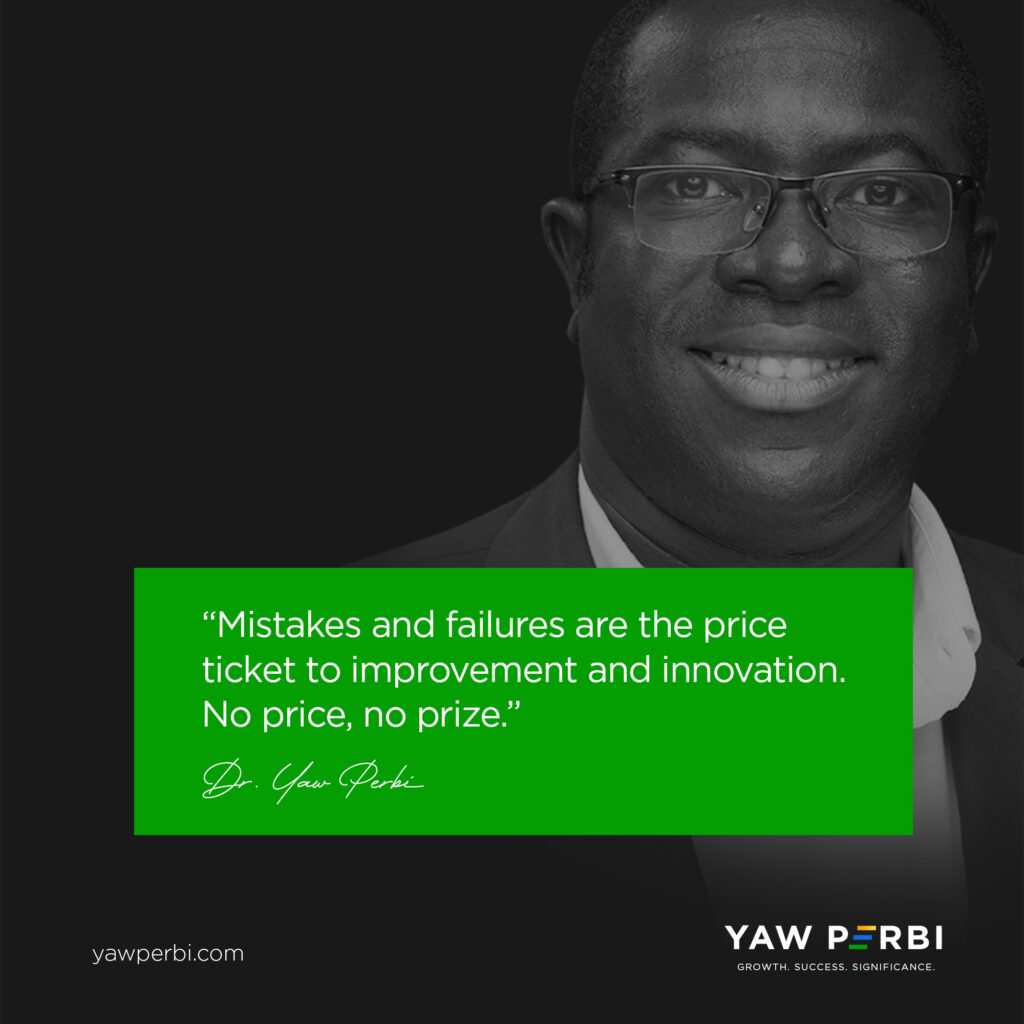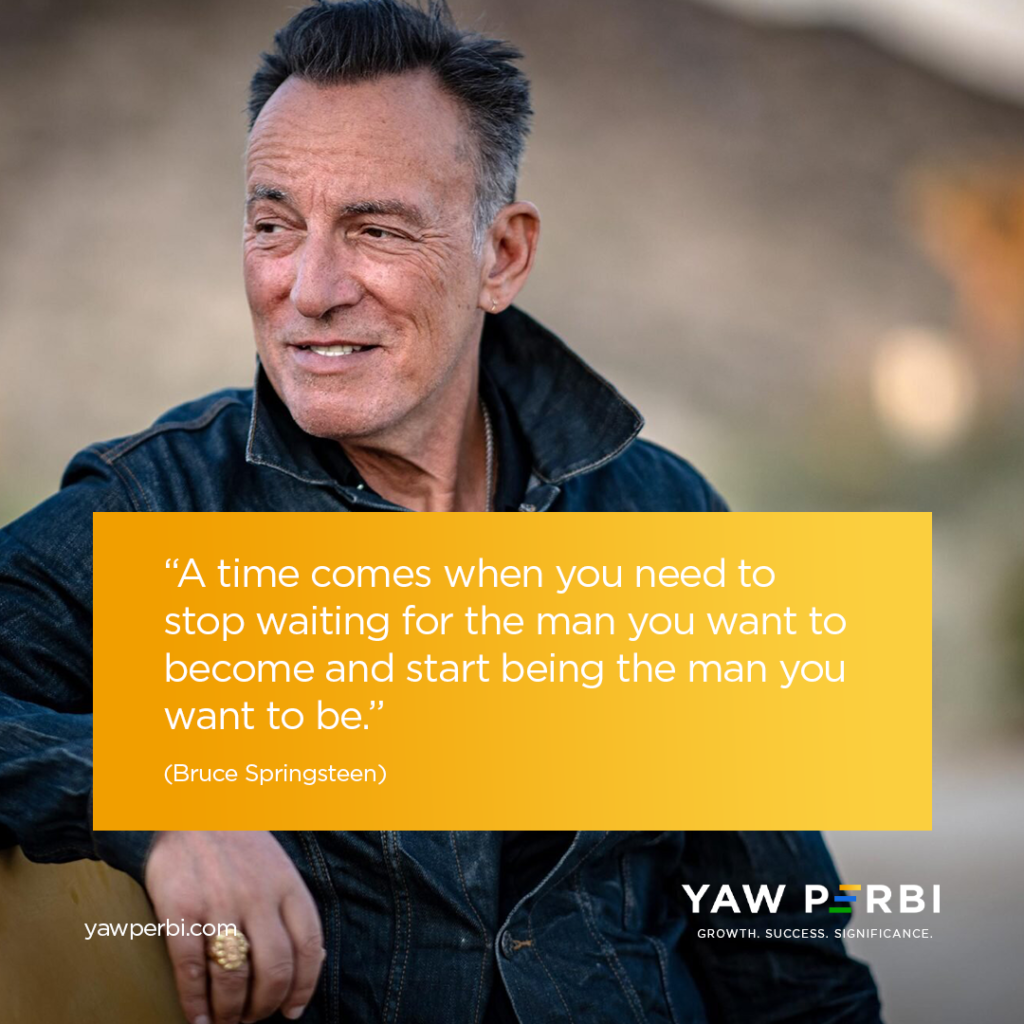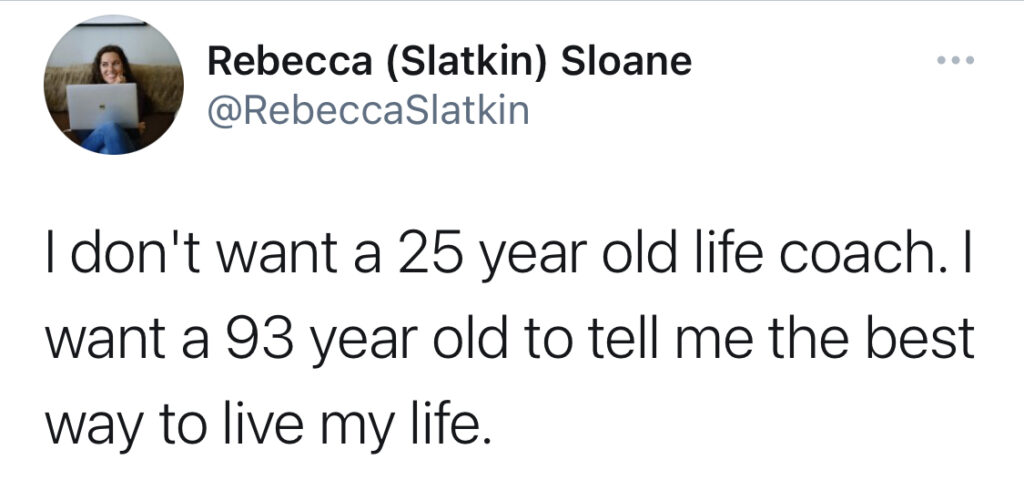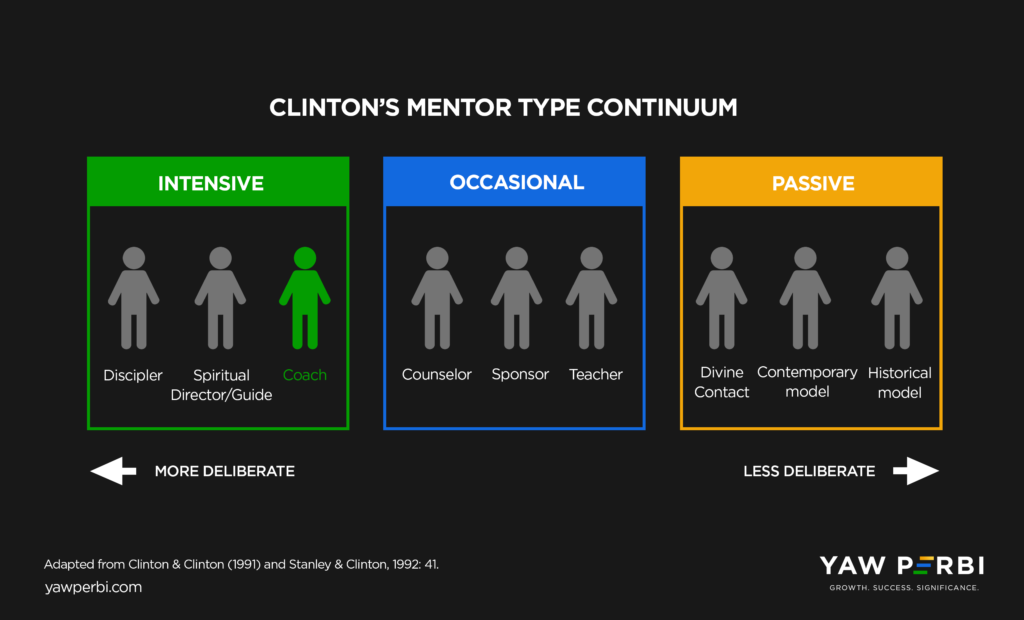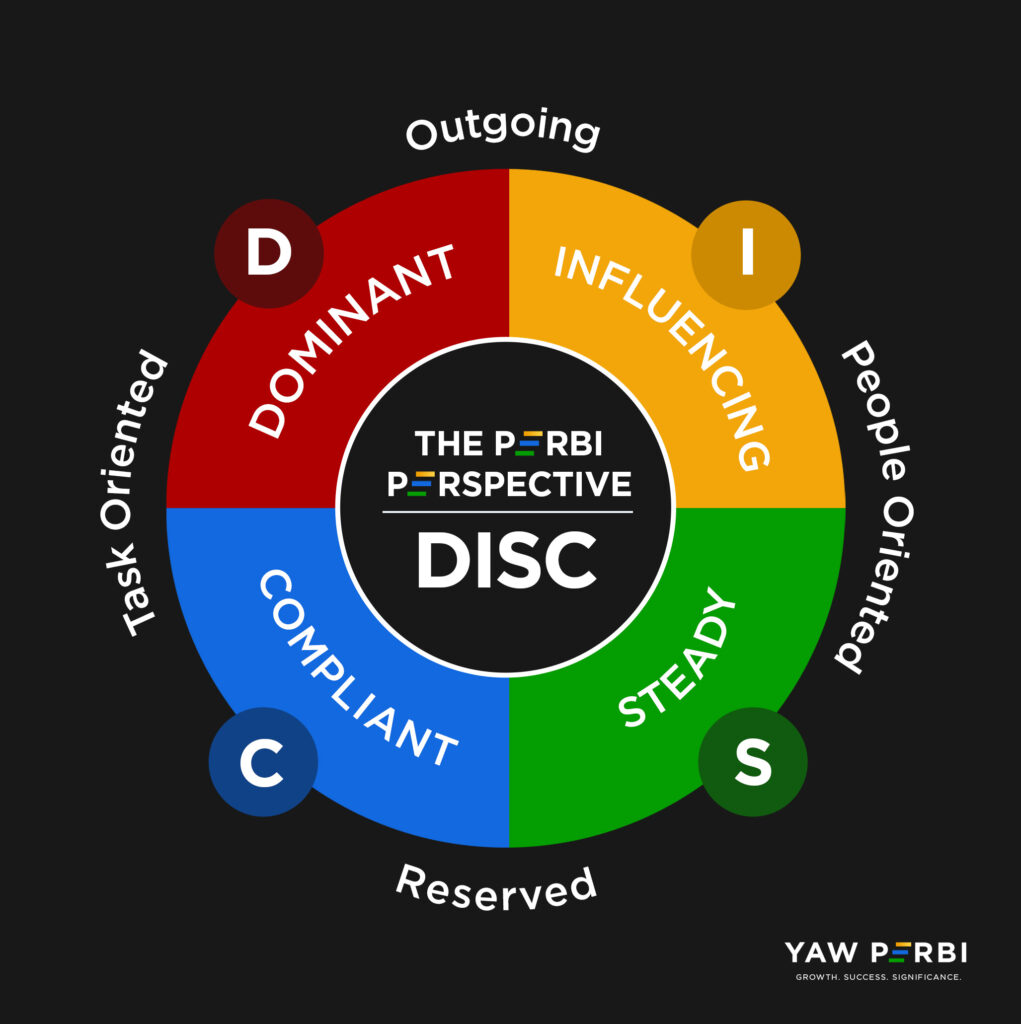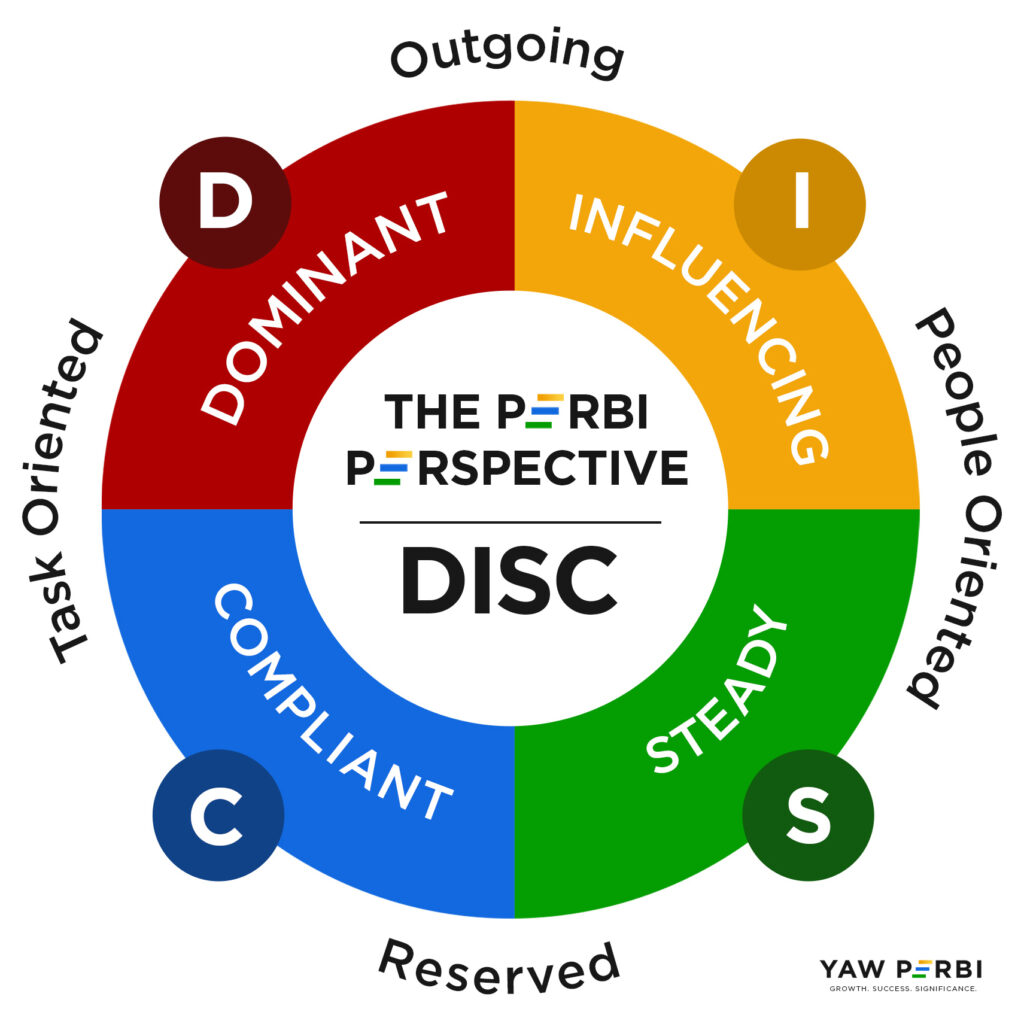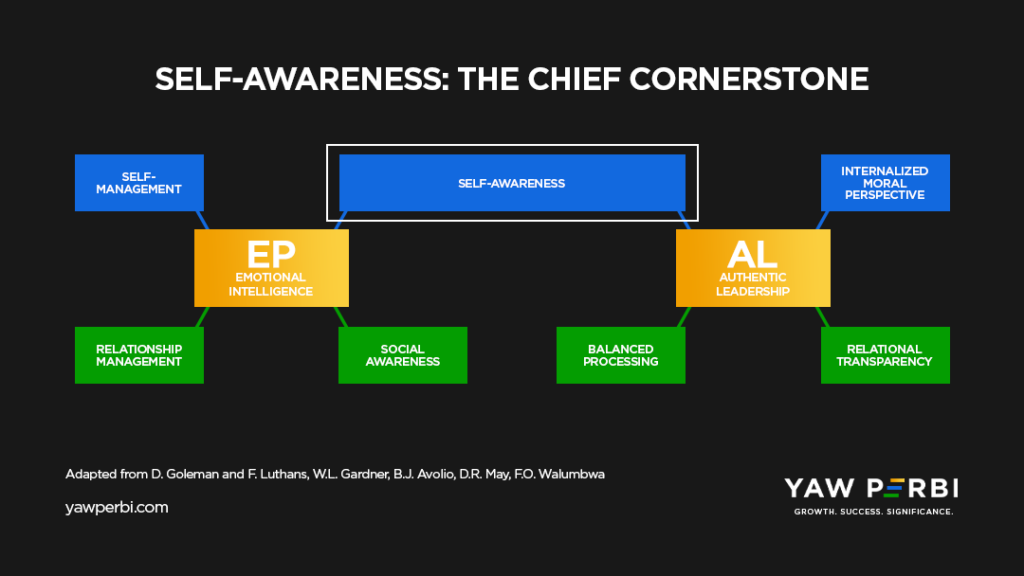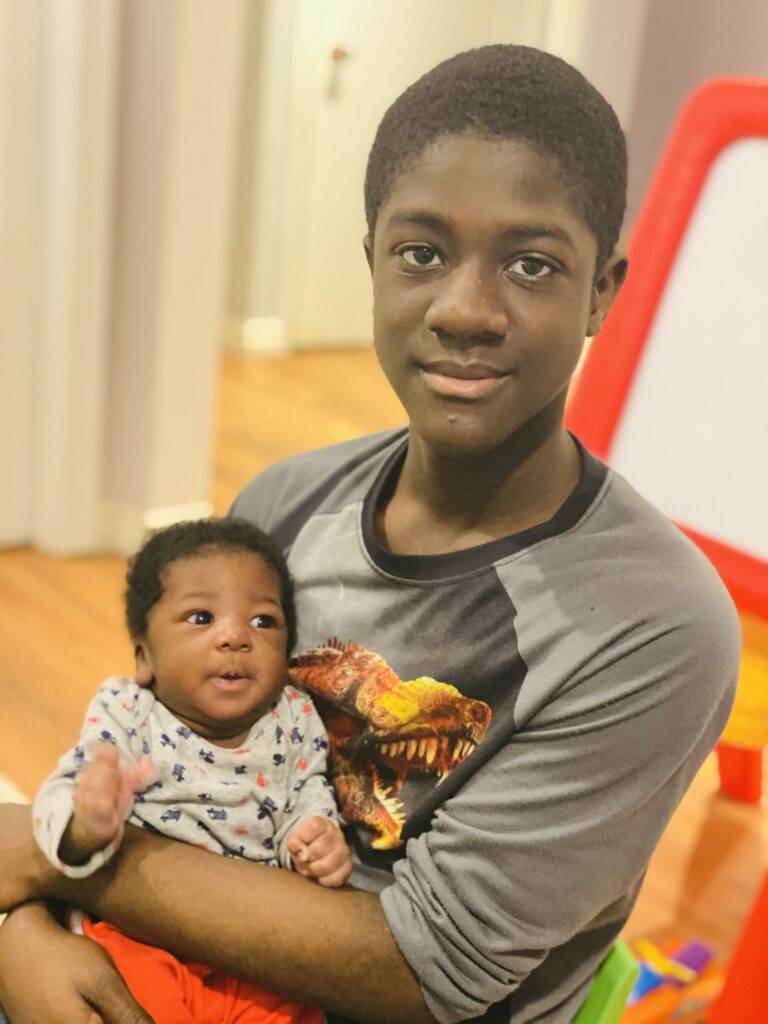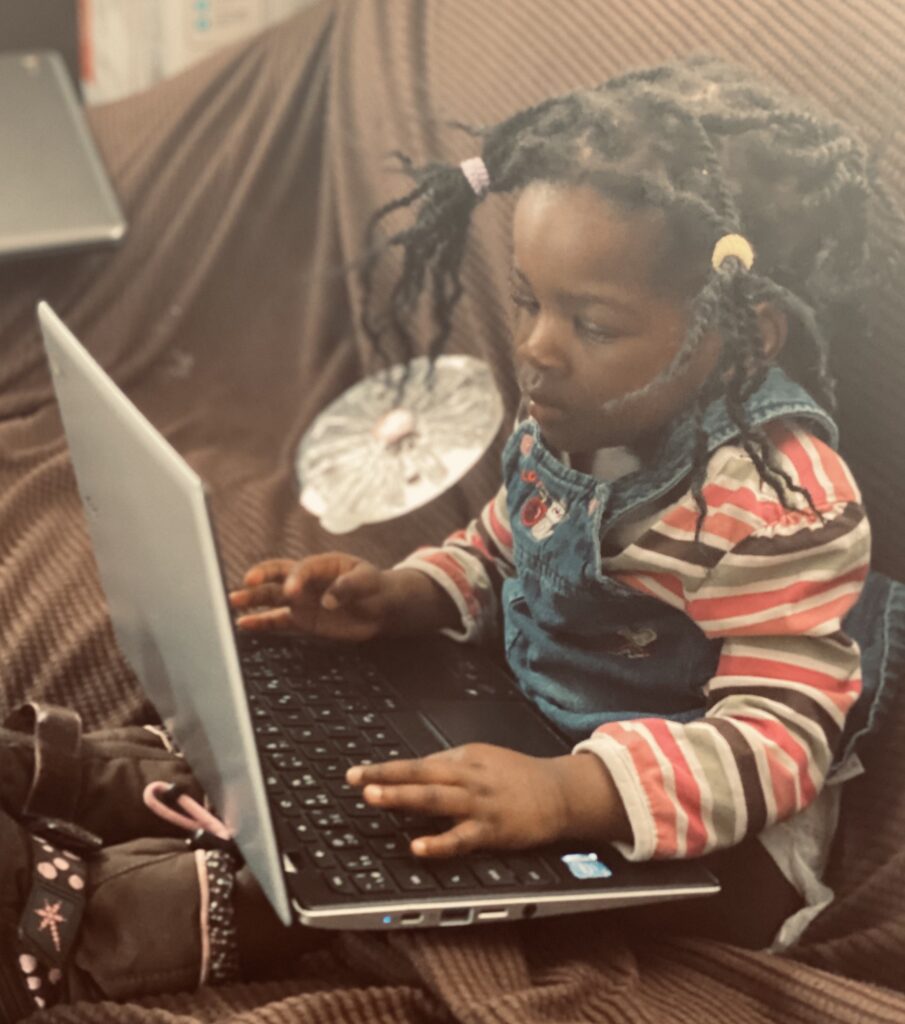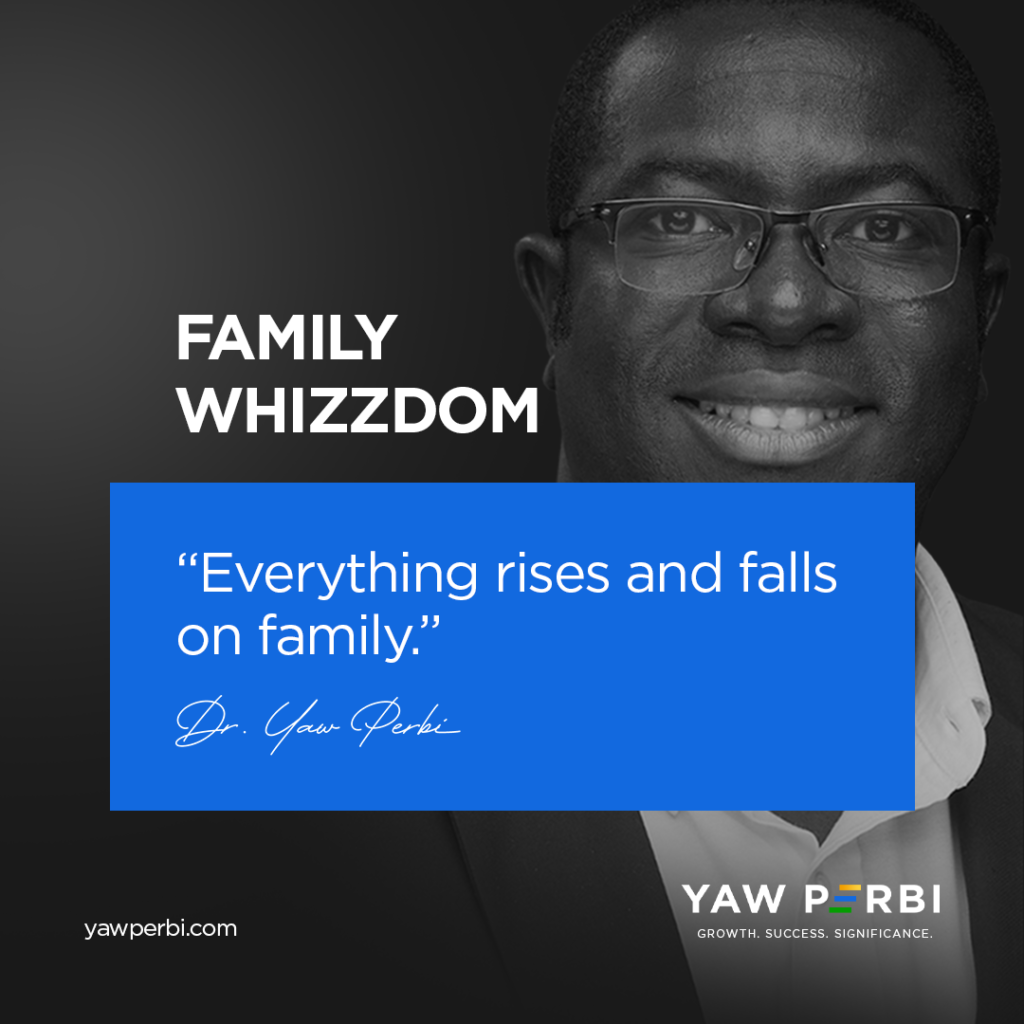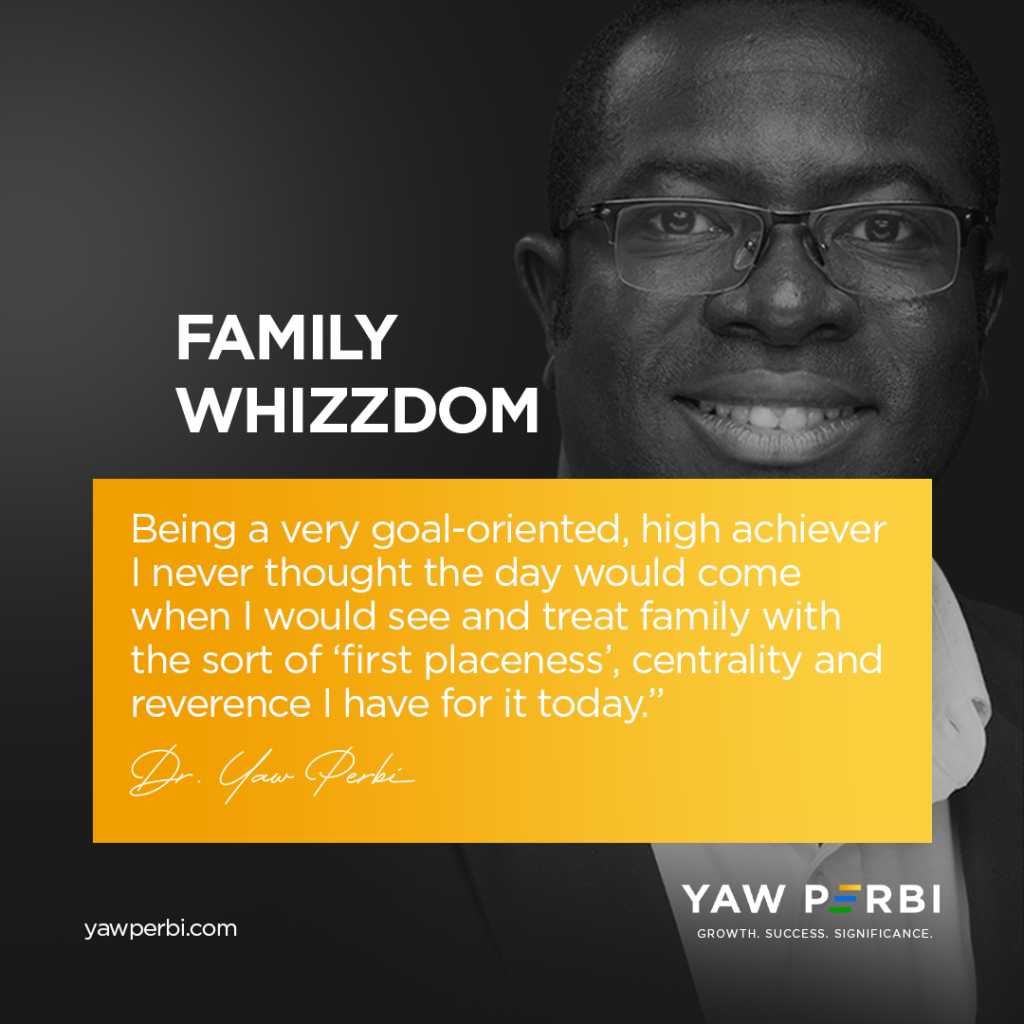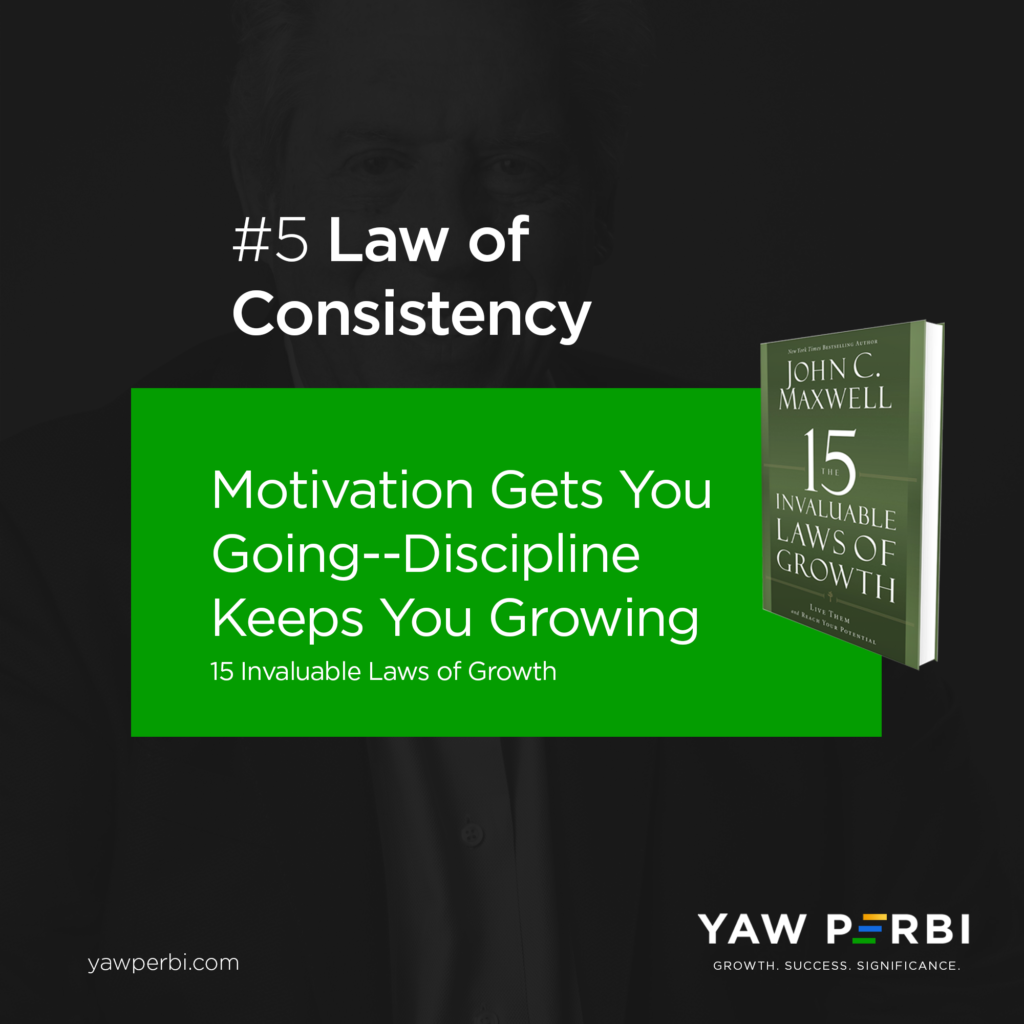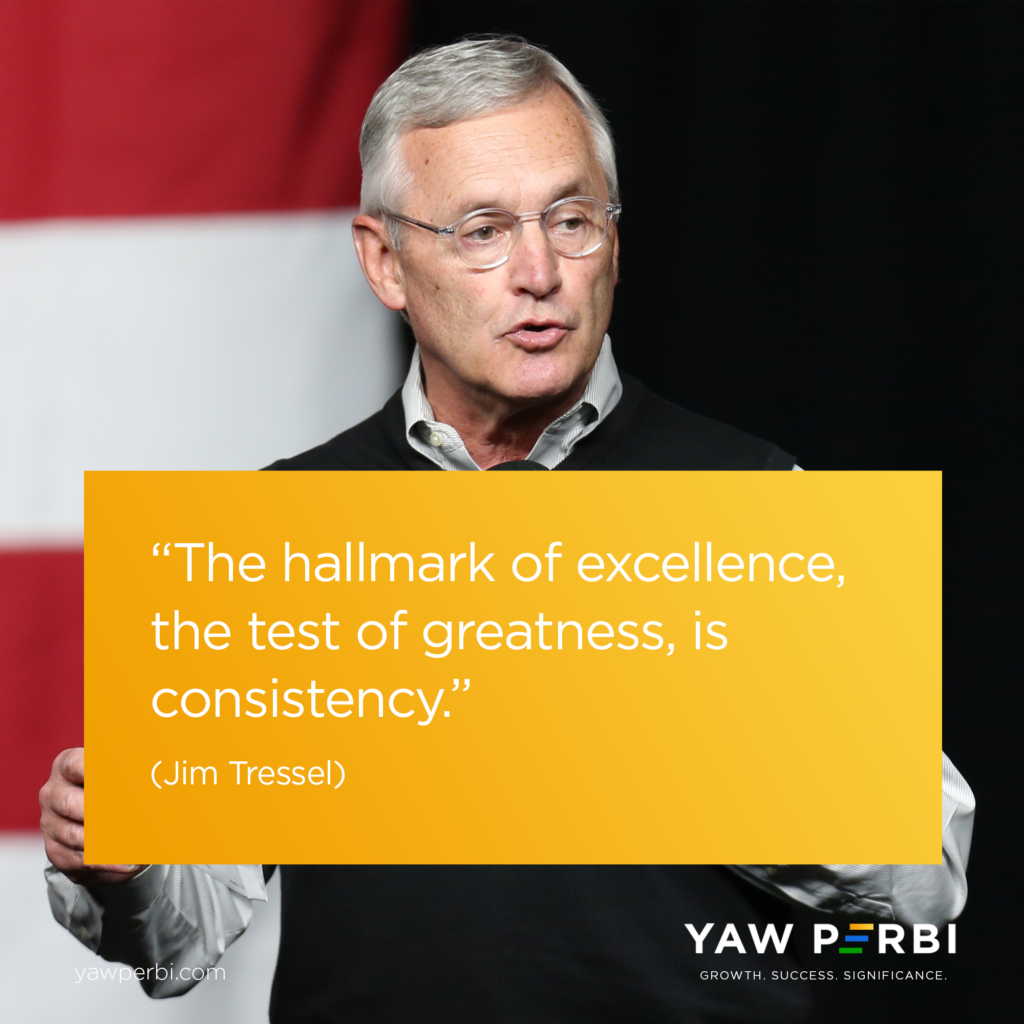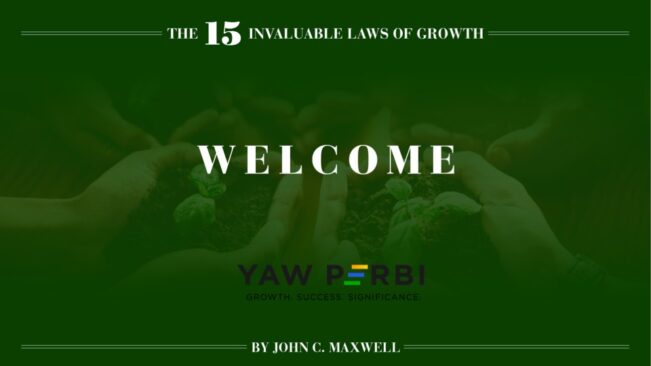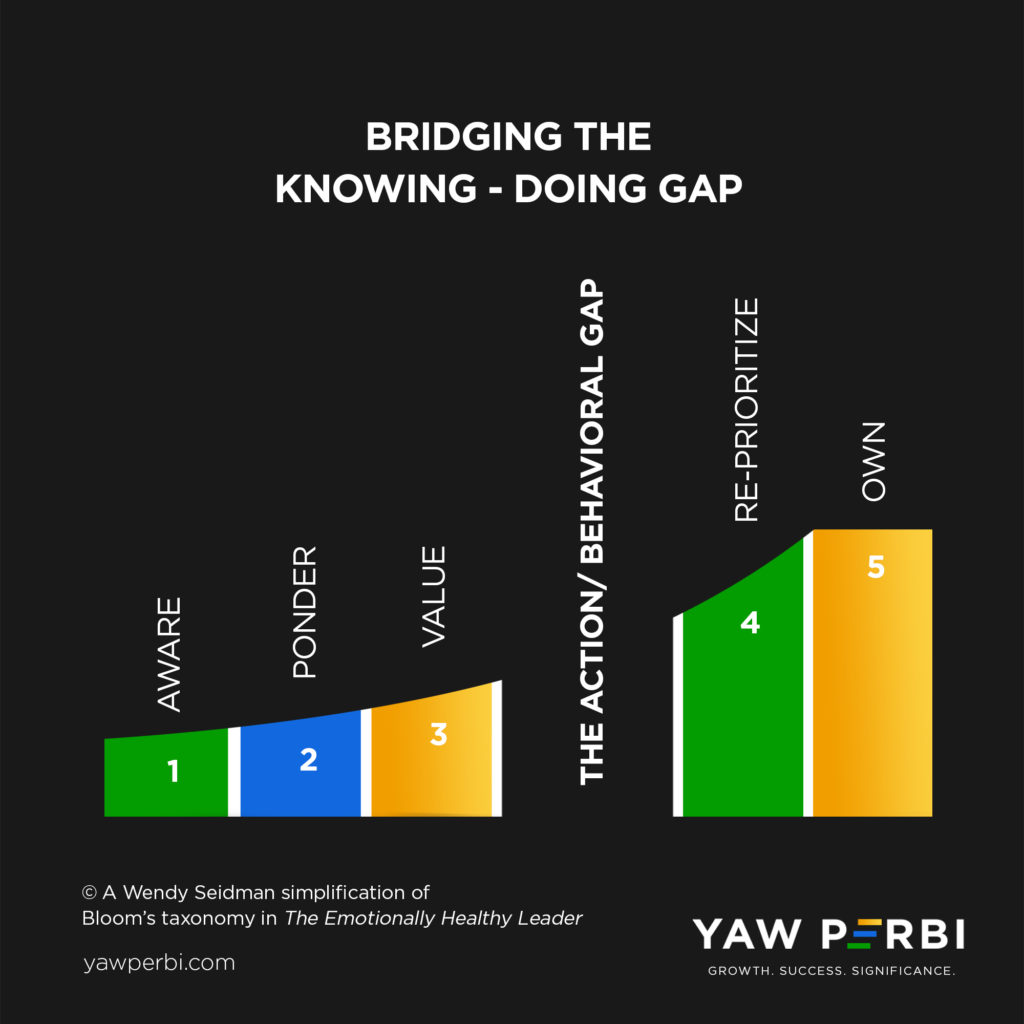
It’s Mid-Year. Time to Close Growth Gaps.
One of my goals at the beginning of the year was to record a short video each week to pep people up in LIFE–Leadership, Integrity, Family, Entrepreneurship. Although speaking-wise I am an award-winning Toastmaster and have been on various media, including hosting television programmes even way back in my medical school days and early professional life, somehow I couldn’t bring myself to starting a YouTube channel and recording something ‘short and sweet’ regularly for my colleagues and coachees.
If today the January goal can now be marked as “done,” having recorded something every single week between then and now (June), it is because I had accountability to close a certain growth gap. The accountability I got was first from my Growth Mastermind group where I shared by goal at the beginning of the year. Exactly on January 15, one of the members, a U.S.-based consultant with Accenture, sent a group WhatsApp message reminding me of my action point to start recording that day. Did I feel ready? No. But to keep my word, I did it anyway! Apparently, we hardly ever ‘feel ready’ for anything. At some point we’ve got to “just do it!” It was Bruce Springsteen the musician who once said, “A time comes when you need to stop waiting for the man [male or female] you want to become and start being the man you want to be.”
MY GROWTH GAPS
In the very opening chapter of his masterpiece on personal growth (Maxwell 2012, 3-9), Dr. John C. Maxwell lists eight growth gaps people get trapped by:
- The Assumption Gap–“I assume that I will automatically grow”
- The Knowledge Gap–“I don’t know how to grow”
- The Timing Gap–“It’s not the right time to begin”
- The Mistake Gap–“I’m afraid of making mistakes”
- The Perfection Gap–“I have to find the best way”
- The Inspiration Gap–“I don’t feel like doing it”
- The Comparison Gap–“Others are better than I am”
- The Expectation Gap–“I thought it would be easier than this”
What had been keeping me from shooting my video snippets and starting my own YouTube channel were the Mistake and Perfection gaps. Those two, I find, are actually two sides of the same coin. There was a ton of information online about how to/not to shoot videos. Now, having 10,000 friends and followers on FaceBook and being well-known and respected in certain circles I didn’t want to come across as a jerk! I was being paralyzed by lighting issues, how my little home office should be arranged, which background would be the best, whether my phone camera was good enough etc. etc.
In fact, I look back with a bit of embarrassment at my first YouTube video which I shot in my decade-old comfy sweater with a Covid-19 bushy hair look, yet I’m so proud that I took the dive. Mistakes and failures are the price ticket to improvement and innovation. No price, no prize. My parents’ generation used to ridicule ‘Made in Japan’ products. My generation has high respect for everything Japanese, from Toyota and Honda through Yamaha to Sony. The Japanese were ridiculed as copycats with poor quality products but the kaizen principle of continuous improvement has brought them this far. Today’s generation has no paradigm of a bad Japanese product. They’ve constantly closed their mistake and perfection gaps. Now, some laugh at China the same way. China would laugh last if they too continually close their growth gaps because guess what? “A mistake is simply another way of doing things,” according to author and professor Warren Bennis. After 10,000 hours of practice, you and I can become geniuses at anything, as my fellow black Canadian, Malcolm Gladwell, asserts in Outliers, largely based on his interpretation of Anders Ericsson’s research.
TO MY FELLOW MISTAKE-AVOIDERS
The desire to find the best way and to be the best is good but I learnt from my mentor John Maxwell looking for the best way can actually be getting things backward. We rather have to get started if we want to find the best way. He says, “it’s similar to driving on an unfamiliar road at night. Ideally, you’d like to be able to see your whole route before you begin. But you see it progressively. As you move forward, a little more of the road is revealed to you. If you want to see more of the way, then get moving“ (Maxwell 2012, 7, emphasis mine).
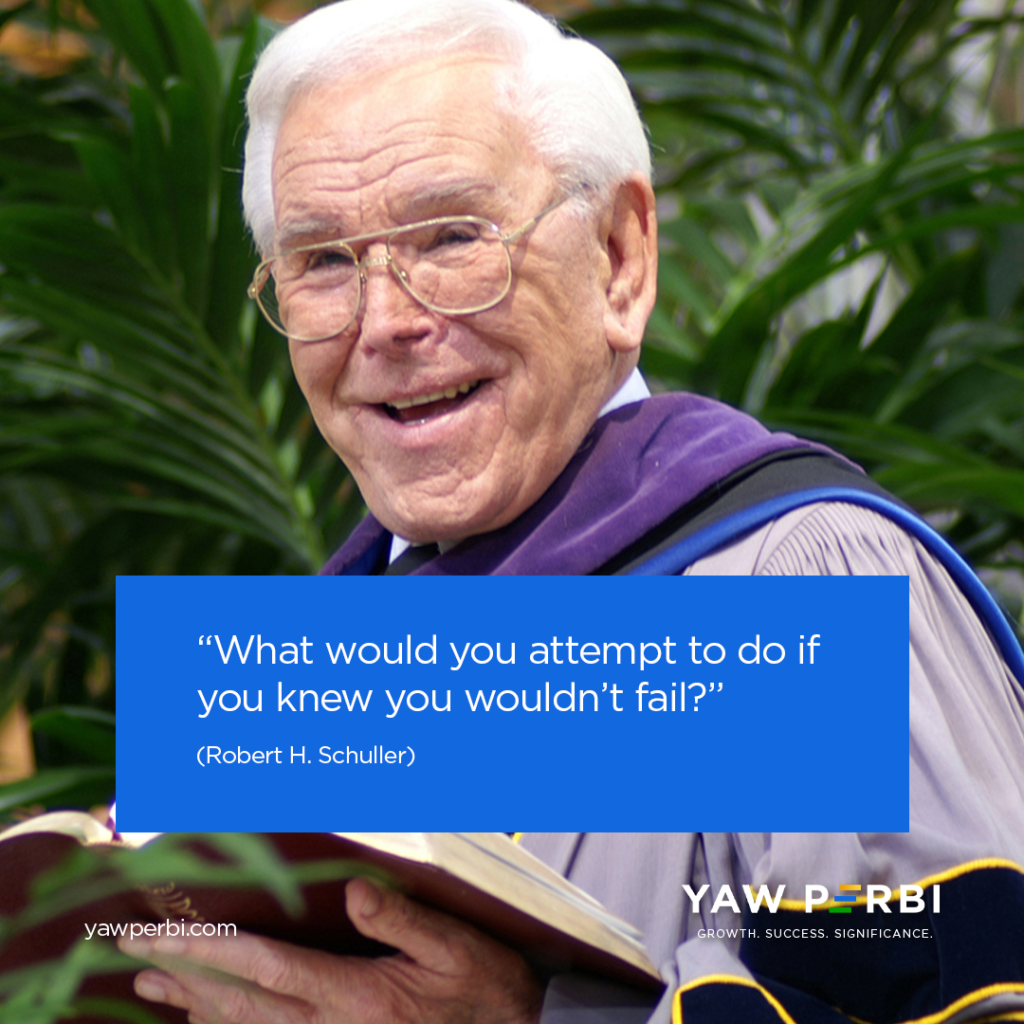
Such powerful words from Schuller’s ‘Hour of Power’ that run for 40 years! What a poignant question!
I once met the American Christian televangelist, pastor, author and motivational speaker Dr. Robert H. Schuller (picture above) in the mid 1990s. As a World Vision Youth Ambassador, my cohort had the privilege of visiting his ‘all glass’ Crystal Cathedral, singing there (oh the acoustics!) and appearing live on his weekly Hour of Power television programme which be began hosting in 1970 until his retirement in 2010. He is noted for many famous quotes but one that has most gingered me to overcome my mistake and perfection gaps has actually been this poignant question of his: “What would you attempt to do if you knew you wouldn’t fail?”
CONCLUSION
So! Half of the year has gone. If you find there’s a gulf between your year-start goals and your mid-year achievements, it’s a growth gap. Ask yourself: “how do I need to grow to close this gap?” If we would resolve to grow and close the assumption, knowledge, timing, mistake, perfection, inspiration, comparison and expectation gaps, we will end the year smiling. Focus on your growth, not so much on your goals. Then you will grow to hit them. I have, in my video-shooting goal. Now off to the rest!
Reference
Maxwell, John C. 2012. The 15 Invaluable Laws of Growth. New York: Center Street.
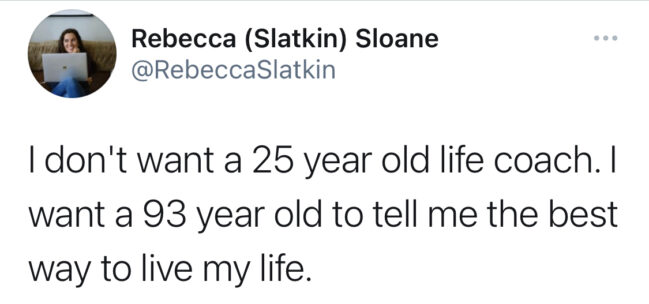
A Most Misunderstood Art: Life Coaching.
This tweet by Rebecca Sloane garnered so many responses last week. And it really ticked me off. It said, “I don’t want a 25 year old life coach. I want a 93 year old to tell me the best way to live my life.” It was sassy and seemed sensible at first sight, on the surface, but I just couldn’t shake it off or let it go scot-free. I’ll tell you why. To be clear, I’m going after the thought; not the person. “Ideas have consequences,” you know.
HUMILITY IS AN ASSET
In the first place, with humility anyone can learn from anyone. Everyone can learn something from anyone. The older can learn from the younger, atheists from people of faith (and vice versa), Christians from Muslims (and vice versa), CEO from new hire etc. This was actually better put by Bill Hybels during one of his Global Leadership Summits I attended: “Armed with enough humility, leaders can learn from anyone.” We can learn from children. Heck, we can even learn from flora and fauna! The greatest teacher that ever lived would place a little child in front of his class and say, “unless you change and become like children…” The good book says, “go and learn from the ant.” With enough humility, everyone can learn something from anyone and anything. Point made.
More substantively, this statement of Rebecca’s is a gross misunderstanding of coaching and as a certified professional coach I would like to set the record straight.
COACHING IS…
Apart from a number of group coaching sessions I run, I am personally dedicated to about a dozen one-on-one coachees, mainly C-level executives ranging from a CEO in agribusiness to deputy CEOs in mining and banking. How does a trained medical doctor get to coach these leaders in such different fields? Meanwhile, some of my coachees are much more advanced in age than me as well. What do I have to offer them then?
Coaching is an inspiring and empowering process that utilizes cogent questions to draw out and clarify thoughts and desires and facilitates a path and framework for their successful implementation for the growth, success and significance of the coachee. As my friend Barbara Wainright, a certified professional coach and trainer of coaches herself, puts it, “Coaching is about empowering your client by asking questions, facilitating strategic planning and monitoring tactical execution.” That is the number one tool of a coach: questions. In fact, with their penchant for asking question upon question, children would probably make much better coaches than adults with a little training and guidance! Yes, that’s how come a 25-year old can coach the writer of the tweet and anyone else twice or thrice their age.
I know I’ve hit a spot whenever a coachee goes, “good question.” The questions a coach asks bring clarity to one’s thoughts and desires, the coaching process inspires coachees to want to be the best versions of themselves they dream of and provides a framework of accountability to make their own word come true. One of my favourite preambles I love to hear from coaching clients is, “I’m beginning to realize…”
Successful life coaching isn’t about the coach–whether they are a 25-year old novice or a 93-year old veteran. It isn’t about what the coach knows, what they’ve accomplished, or even what they are doing in life. It is all about the client.
In fact, as Ms. Wainright reiterates, “coaching is about empowering your clients to decide for themselves what their goals are. It’s about Socratic Questioning and attentive listening. Coaching is about understanding your client’s needs, goals, desires and life purpose. Coaches help their clients to identify and clearly articulate their goals and dreams. Coaches help their clients to remain accountable and help strategize the action steps required to achieve their objectives.”
COACHING ISN’T COUNSELLING OR CONSULTING
I have been wanting to make these distinctions between coaching, counselling and consulting clear for quite a while as even prospective clients sign up for coaching with me expecting a masterclass or therapy session of sorts. Ms. Sloane’s tweet was the last straw that broke the camel’s back. As a student of Dr. Robert J. Clinton’s work at Fuller Seminary, I am of the opinion that coaching, counselling, and consulting are all types of mentoring (see an earlier blog here). Counselling, consulting and coaching have at least one thing in common: they all require great listening skills.
However, counselling is about helping your client by listening and offering advice and sharing coping skills. Consulting is about having all the answers and solutions to help your client with a specific task (hopefully after listening well). There is some form of mentoring (I’m not sure what to call it, perhaps ‘combo-mentoring’?) that combines coaching, counselling and consulting where the mentor empowers the mentee by asking questions, sharing valuable experiences, giving advice for growth and solutions for success. Strictly speaking, that isn’t life coaching in the purest sense of the art.
As may be obvious to you by now, counselling, consulting, and this combo-mentoring all require one to be significantly knowledgeable about the issues being addressed. That would make Rebecca Sloane’s tweet understandable but coaching on the other hand, requires the ability to ask contemplative questions, listen incarnationally, and ask even more profound follow-up questions till the client finds their own answers and makes their own commitments. Consequently, the coach doesn’t need to even know about the client’s field or have experience in the area of life they want to be coached in to help them. With the others, the professional is the driver; with coaching the client is.
DEAR REBECCA…
So dear Rebecca, a life coach doesn’t tell you anything, let alone how best to live your life. There are over 50 coaching niches–from life coaching to executive coaching to career coaching. None of them tell you how to live your best life but they will set the table for you and provide a menu of questions for you to figure out what your life meal should comprise of. For sure, find a 93-year old counsellor, consultant or combo-mentor to tell you how best to do life but if it is a coach you’re really looking for, even a 25-year old novice would do. It is about their questions; not their answers. It’s about you; not them.
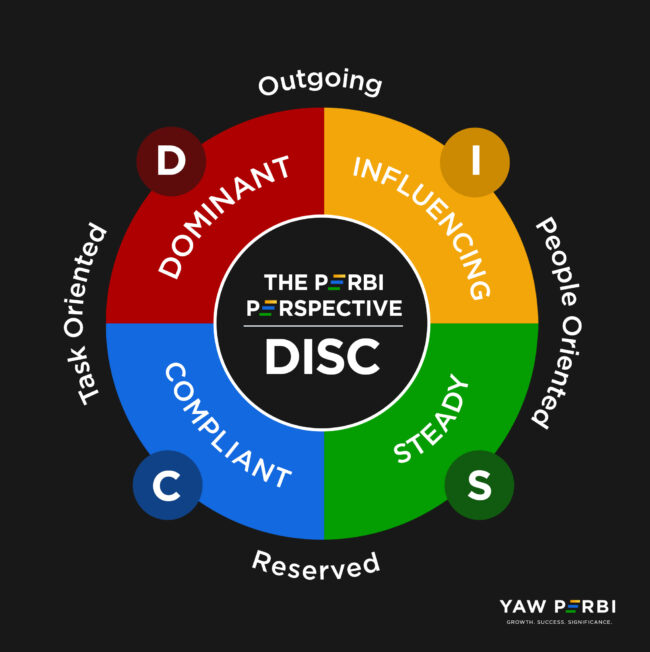
Getting DISCed is as Important as Getting Vaxxed!
It’s amazing how much most people know about subjects in our world, literally from Archaeology to Zoology, but very little or no ME-logy! In my book, Cutting a Straight Path: Leading with Self-Awareness, I ask these poignant questions:
- How can you live with yourself without knowing who you are?
- How can you be true to what you know little or nothing about: yourself?
- How can you succeed in life, self-actualize, without first becoming self-aware?
- How can you authentically lead others without first learning to know yourself?
- Have you ever felt frustrated why others are hesitant to follow your lead?
“Maybe it’s time to check yourself as a person and as a leader,” is my conclusion. Yes, it’s about time! Indeed, the Chinese have a powerful saying, “Before preparing to improve the world, first look around your own home three times.” Forget about authentic living, let alone authentic leadership, without self-awareness! So welcome to home base. Self-awareness is the starting place of all true and lasting success.
SELF-DISCOVERY THROUGH THE DISC
Self-awareness comes basically by introspection (by ourselves) and feedback (by others). Both however, are greatly enhanced by assessment tools, just like magnifying glasses help us see tiny objects and the binoculars enables us to view distant things closely and clearly. I have found the DISC as an amazing personal assessment tool that is incisive and powerful in the quest for self-awareness. Since 1972 it has been used by over 50 million people to increase self-awareness, stimulate and guide growth and thus increase chances at personal success. It is used to engender teamwork, communication and productivity in the workplace. The DISC has saved many a marriage, including mine!
DISC assessments are used in thousands of organizations around the world, from multilaterals and multinationals to government agencies and Fortune 500 companies, nonprofits and small businesses. Recently, we were privileged to serve the Centre for Disease Control Foundation in Atlanta, USA with nearly 150 of these assessments as they train medical leaders in about 30 nations of the world.
SO WHAT EXACTLY IS DISC?
DISC is an acronym that stands for the four main personality profiles described in the model: (D)ominant, (I)nfluencing, (S)teady and (C)ompliant.
People with D personalities tend to be confident and place an emphasis on accomplishing bottom-line results.
People with i personalities tend to be more open and place an emphasis on relationships and influencing or persuading others.
People with S personalities tend to be dependable and place the emphasis on cooperation and sincerity.
People with C personalities tend to place the emphasis on quality, accuracy, expertise, and competency.
The DISC system we use at YAW PERBI in partnership with People Keys generates 41 personality blends from these basic four, just like many colours of the world are generated through the three primary colours. There’s one I used to coach international students in Canada that was limited to 28 personality blends. What we use now is like the difference between a regular car and a four-wheel drive. As they like to say at People Keys, “people are different, true, but they are predictably different.”
CONVICTION, VISION & MISSION
Our conviction at YAW PERBI is that since every true and lasting success begins with self-awareness, then everyone must have easy and affordable access to self-DISCovery! ACCESS FOR SUCCESS, please! Everyone has a right to self-awareness. We need a DISC Revolution!
Our vision is to see a world of awareness through every individual’s self-DISCovery. We are on a mission to democratize the DISC personality/behavioral assessment until no one is left in the dark. We want to recalibrate all leadership development to begin with self-awareness at the core through the Perbi Perspective DISC is a great start.
CHIEF CORNERSTONE FOR THE CHIEF-LEVEL LEADER
When you read my article on how I build leaders differently now (compared to 10-15 years ago), you will understand my seriousness about this issue of recalibrating all leadership development to begin with self-awareness. People have big, fat leadership books and terabytes of leadership materials and yet have next to zero knowledge of themselves. What sense is there in that? I was telling a certain Christian leader the other day that he can forget the list of a dozen books people typically ask me to recommend for leadership training and development. The only two books his emerging leaders need to learn almost everything they need to know about leadership are a self-awareness printout of their DISC assessment and the Scriptures. Every other book is garnishing.
In all the major success paradigms, praxes and paths—from Emotional Intelligence to Authentic Leadership—self-awareness is first base, the chief cornerstone. I increasingly get alarmed when I encounter C-level executives, both in the public and private sector, who have never taken a personality assessment like the DISC!
STRATEGY AND HOPE
Some say hope is not a strategy but I beg to differ. (I’ll leave that argument for another day, another blog). I have hope that together we can strategically exponentially multiply impact through an army of Accredited DISC Coaches and Certified Behavioural Consultants while significantly creating thriving businesses and income for all! Just like our governments wish to get everyone vaccinated, we at YAW PERBI desire to get everyone DISCed! The former may be controversial to some, but you had better not second guess the latter. Everyone has a right to self-awareness to grow and succeed. Would-be authentic leaders really have no choice in this primary matter. We need a DISC Revolution!
P.S.
If you want to join the DISC Revolution by becoming an Accredited DISC Coach or a Certified Behavioral Consultant click here. Anyone who wants to get DISCed personally may start here.
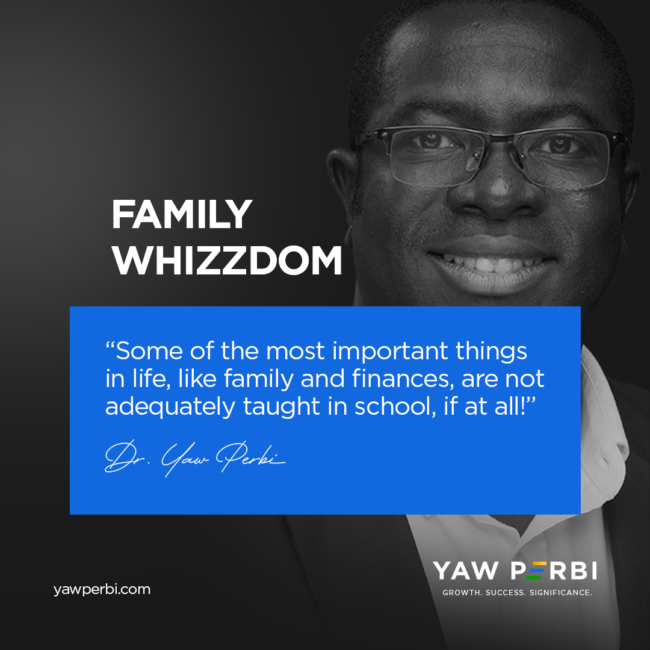
7 Reasons Why the Systematic Study of Family Matters
It gives me great joy that a number of high-flying professionals have chosen to pay up and show up at this year’s Family Foundations mastermind. The interesting group contains two professors (of marketing and microbiology), a couple of finance people (one of them works at the central bank of Ghana) and connecting online from three countries.
I admire their zeal and humility to jaw-jaw about family matters but something in me also makes me quite sad: Why are some of the most important things in life, like family and finances, not adequately taught in school, if at all?! Mind you, this current Family Foundations mastermind cohort has three people with doctorates, two PhDs and an MD!
The major thrust of this mastermind is to cause a paradigm shift on the prime place of family for us personally, for society in general and even for posterity (in other words WHY family matters) but even before delving into that everyone is being exposed to WHY a systematic study of family itself is necessary in the first place. Here are seven reasons why:
1. To understand SELF better.
“A systematic study of family will enable you to untangle your emotions from your understanding of family. An objective look at the varieties of families will better equip you to understand your own family relationships. This will allow you to bypass your preconceived ideas about marriage and family, come to a better understanding of yourself and your role within your family, and make more informed choices regarding future relationships.” (Riggs & Tweedell, pg. 2)
2. To understand OTHERS better.
“Taking a systematic view of marriage and family life will enable you to better comprehend the world in which you and your family operate.” (Riggs & Tweedell, pg. 3)
3. A way to uncover and derail MISCONCEPTIONS and MISPERCEPTIONS.
“People enter marriage and family relationships with a wealth of misconceptions and misperceptions… some common myths about mate selection, marriage, and parenting. With an objective understanding of marriage and family life, you should be better equipped to prevent or derail disillusionment in your future relationships.” (Riggs & Twedell, p.3)
4. To positively IMPACT your world.
We are “called to make a difference in the world. What better place to make a difference than within your own family? Most people are not called to a foreign country to perform mission work; they can find mission work right in their own communities. By understanding the varieties of ways of “doing” family, students can help those around them actualize the best marriage and family relationships possible.” (Riggs & Tweedell, p.3)
5. We need to get down to the core of all our beliefs, values and behaviour: WORLDVIEW.
6. Some of the most important things in life, marriage and family, are not adequately TAUGHT IN SCHOOL, if at all!
We’ve got to find these through an attitude of lifelong learning and a pursuit of informal and semi-formal growth opportunities like masterclasses and masterminds.
7. There are ancient THEOLOGIES, modern THEORIES, and practical TOOLS that make family work.
CONCLUSION
In the end, nothing works until you work it! And we have no right to say something doesn’t work unless and until we have worked it the prescribed way. I agree with Mark Twain that schooling and education are not the same. No matter how much schooling you’ve done, perhaps it’s time to get yourself an education on why family matters and how to make it work.
Reference
Riggs, Barbara A. And Cynthia Benn Tweedell. 2010. Marriage and Family: A Christian Perspective, 2nd Edition. Marion, Indiana: Triangle Publishing.
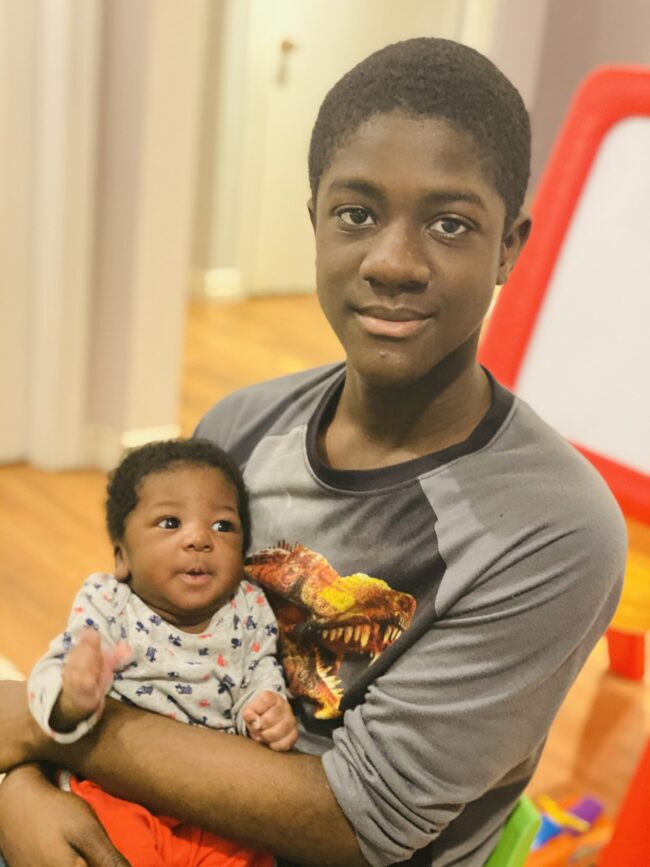
Family Foundations No One Lays Yet Everyone Needs
One of the most stupid things I’ve ever done is to travel 10 whole years into marriage before ever seeking formal post-marital counselling. After the several pre-marital sessions lasting many months in 2006, Anyele and I went in the power of that for a decade until we felt we needed further formal, external help. Why on earth did we do that?
Come to think of it, every 5,000 km or so we were changing the oil in our car and getting it serviced yet not so with our marriage. Doesn’t every marriage need regular marriage maintenance? Why wait till we’re sick before we see a doctor when we can at least do annual check-ups? In fact, I would say we came from a culture where seeing a counsellor connoted there was a pathology; and not so much a maintenance thing.
Friends, I’ve had several conversions since August 12, 2006 that have better aligned and further fortified what I thought were already ‘excellent foundations.’ Sometimes there’ve even been foundational cracks I’ve had to fix (and God knows I’m not done). For time to time I’ve come across new information that has caused me to repent, have a change of mind, and realign our foundations to keep this family building strong and lasting.
EXAMPLES OF FAMILY FOUNDATIONS TO REVISIT
Feel free to say “shame on you Yaw” but I had never heard of a family genogram until barely five years ago! How could such an important tool and exercise not have been part of our foundations when we set out a decade-and-a-half ago? And if you’re asking “what the heck is that?”, then trust me, you don’t even know you need one until you eventually discover it. Afterwards you would wonder how in the world your family had been surviving without one. I say ‘surviving’ because you will then notice that what you thought was ‘thriving’ wasn’t quite so.
Then there are basic tools for connecting with spouse and children on a deep emotional level we only received in the last five years. We learnt the 10/10 from the Pellmans and Temperature Reading from the Scazzeros. “Love your wife,” yes I want to. “Respect your husband,” yes she wants to. But how? The Kraemers also gave us tools for this.
And all this is for a good-looking couple who had a pretty solid family heritage, coming from a few generations of good Christian homes, being smart, leaders of our church youth fellowship who had lived virtuously and gotten married as virgins. We even themed our wedding “a celebration of purpose, passion and purity.” Alas! We who ‘had it all’ have realized there are family foundations everyone needs yet almost no one lays. The very marriage mentors who have been blessing us with these paradigms, praxes and practical tools are passionate about their ministry of marriage mentorship today precisely because they themselves didn’t have these when they were our age!
Family is a BIG deal. It is the basic unit of society, just like the cell is for all biological life and the atom is for all matter. Yet the thing about family foundations is this: just like finances, very little about how to make it work well is taught in school about it. If one isn’t fortunate to have a spiritual community that provides quality family life information and formation, you’re in a hard place. There are many divorces that are preventable, if the foundations could be reconfigured. There are some we’ve been able to help save by God’s grace; and others… well… too bad, too late.
THE MOST IMPORTANT PART
Few will argue against the assertion that the most important part of a building, or anything else that is built for that matter, say a marriage, is its foundation. A ton of things have been said about foundations. Gordon B. Hinckley asserts, “You can’t build a great building on a weak foundation. You must have a solid foundation if you’re going to have a strong superstructure.” Adding his voice, David Allan Coe says, “It is not the beauty of a building you should look at; its the construction of the foundation that will stand the test of time.” The greatest teacher of all time, Jesus Christ, classifies life builders into two categories, wise and foolish, purely based on thee foundations they lay: the foolish build on sand, the wise build on rock.
My beloved mentor Peter Scazzero talks about foundations a lot in the Emotionally Healthy Leadership paradigms he teaches. And no wonder, since like the typical New Yorker he is, Pete is ever so familiar with the skycraping towers of Manhattan. This is how he explains the importance of digging deep foundations if we are to build life’s tall towers of significance:
Manhattan consists almost entirely of bare granite, a very hard and strong type of rock. To carry the weight of a 75 or 100 story skyscraper, foundations known as “piles” are used. These are concrete or steel columns hammered into the ground with a massive crane until they penetrate solid rock.
Some pilings go twenty-five stories under the ground. The heavy weight of the skyscraper is then distributed through each of the deep “piles” in the ground below. Together they are capable of supporting the structure’s enormous weight.
If the pilings are drilled in poorly, cracks eventually appear in the structure. Entire buildings may lean. Then they must be torn down or lifted completely so the piles can be reset – a costly and time-consuming process.
FAMILY FOUNDATIONS MASTERMIND
As you might be aware from a previous blog, “a mastermind group (often shortened to just ‘masterminds’) is a peer-to-peer mentoring group used to help members learn together, solve problems, birth new ideas and gain clarity with input and advice from the other group members.” For eight weekly sessions, from April 4 to May 30, I shall be walking along with a dozen leaders who want to re-examine their family foundations and receive new paradigms, praxes and practical tools to finally fix faulty family foundations. Inputs will include several book chapters, videos, articles, practical exercises, discussions and debates. Two special features and benefits will be FREE membership of an online chest of over 20,000 resources and a FREE DISC Personality assessment with a 37-age customized report!
You can be sure that “mastermind groups are great in holding each other accountable for the goals and outcomes each member comes up with themselves” (see here). Outcomes and outputs of this particular Family Foundations Mastermind are as follows:
- Paradigm Shift on the Prime Place of Family
- Ancient Wisdom Applied
- Current Family Systems Theories Tested
- Practical Relationship Tools (for emotional connection, communication, forgiveness)
- Family Genogram
- Behavioural Assessment
- Emotional Needs List & Action Points
- Family Mission Statement
- Hierarchy of Priorities Configuration
- Integrated Life Exploration & Commitment
Register here and let’s go back to basics. Let’s finally fix faulty family foundations that everyone needs to but hardly anyone does.
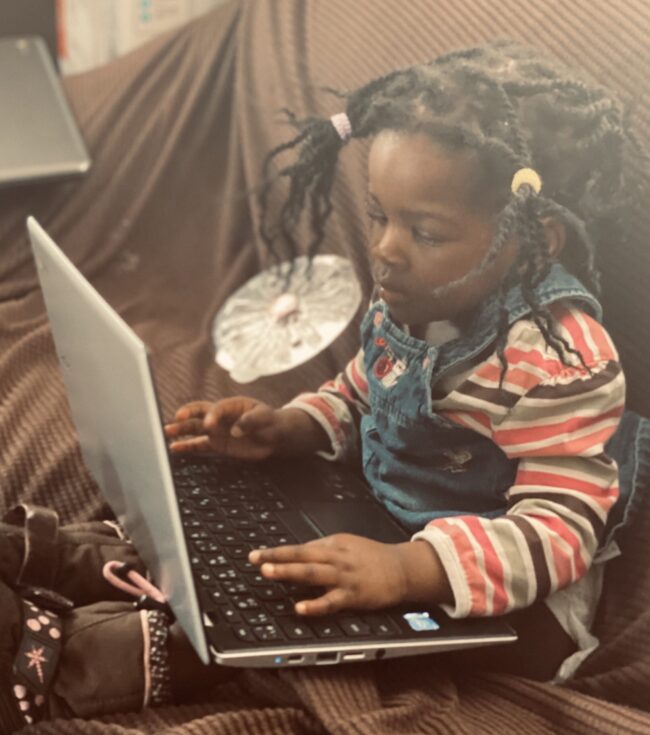
Work harder on yourself than you do on your job.
Over the last week, somehow this notion of needing to work harder on yourself than you do on your job has come up with two or three different coaching clients. For the CEO of a crucial agro business firm in West Africa, the financial services entrepreneur in Canada and the PhD-wielding academic on the east coast of the United States, the three reasons I’m about to share held true. It is true for you too.
For the record, I work hard and believe in hard work. I also work smart and absolutely promote the idea of brain over brawn anyway. Over a decade ago I came up with the phrase, “brain power pays; muscle power pains.” I subscribe to the Pauline exhortation that “whatever you do, work at it with all your heart, as working for the Lord and not for man.” So by all means, work hard and smart on your job, but work even harder and smarter on yourself.
Here are three reasons why:
1. WHO YOU ARE IS MORE IMPORTANT THAN WHAT YOU DO
No matter how hard or smart you work, the instrument for the doing the do is you. If the input into you doesn’t match or exceed the output, that will soon be your undoing. Let me put it in a way one of my staff in British Columbia said it to me a few years ago: “If your output exceeds your input, then your upkeep will be your downfall.” Classic! Not only will you soon not be effective and efficient when your self input is less than your job output, it is unsustainable and you might end up becoming irrelevant. And sometimes, irrelevant not just in terms of knowledge and skills for a context that has progressed because you’re not healthy or even physically alive anymore–you killed the goose that lays the golden eggs!
Consider these sagacious words of educator Palmer Parker:
“When I give something I do not possess, I give a false and dangerous gift, a gift that looks like love but is, in reality, loveless—a gift given more from my need to prove myself than from the other’s need to be cared for…. One sign that I am violating my own nature in the name of nobility is a condition called burnout. Though usually regarded as the result of trying to give too much, burnout in my experience results from trying to give what I do not possess—the ultimate in giving too little! Burnout is a state of emptiness, to be sure, but it does not result from giving all I have; it merely reveals the nothingness from which I was trying to give in the first place.”
Remember, who we are is more important that what you do, because we do whatever we do out of who we are: our identity, character, values.
2. ONE MEANS A LIVING, THE OTHER MEANS A FORTUNE
Classic motivational speaker of blessed memory, Jim Rohn, poignantly put this in a way like nobody else has: “Learn to work harder on yourself than you do on your job. If you work hard on your job you can make a living, but if you work hard on yourself you’ll make a fortune.” This statement, I believe, is a variation of timely advice Jim himself received from his mentor J. Earl Schoaf. Jim had heard him give the reason for why the job only pays the bills but the latter ends in billions: work harder on yourself than you do on your job; your income is directly related to your philosophy, not the economy; and for things to change, you must change.
From a one-year college drop out living from pay check to pay check as a stock clerk at Sears, this advice catalyzed a five-year mentorship of Rohn by Shoaff, encouraging him to develop himself and pursue his dream of a better life such that by age thirty one, Rohn was a millionaire! It was a really sad day when this motivator of motivators like Anthony Robbins, Less Brown, Brian Tracy and Denis Waitley, passed away in December 2009.
Friend, work harder on yourself–from your paradigms through your attitudes to your skills. It’s the software that you carry and apply to a variety of endeavours, not only your job, that will unlock abundant wealth and well-being.
3. JOBS COME AND GO BUT YOU’LL STILL BE HERE
Sometimes people leave jobs; other times jobs leave people. In the kind of post-pandemic economies we have now, more jobs leave people than people leave jobs. Certain whole industries have been wiped out, for crying out loud! I’ve marvelled at how many pilots have been literally grounded and have had to find some other kind of livelihood. What if all you did was work hard on your job and never grew your other interests, talents and skills or even never networked beyond the ‘boys club’ in your profession?
When many years ago I decided to take the path of the risk of entrepreneurship rather than the ‘security’ of a regular paid job, some people who thought I was crazy later found out they had been crazy to think ‘owning a job’ was better than owning a business when in spite of their qualifications, loyalties and skills their jobs were cut. Former Microsoft COO, Kevin Turner, said it best: “The only job security we have is our individual commitment to personal development.” Your job today may not be there tomorrow–in fact your entire industry might not be there–but you will. Work harder on yourself than you do on your job forwhen tomorrow comes, your preparation will meet opportunity. That’s what they call success.
QUICK PRESCRIPTION
Do the following to ensure you are working hard on yourself for your personal growth and development: set aside a time for YOU, a ME time, everyday. Mine is 5-6am everyday during which I read my personal mission statement, review my goals, read for at least 15 minutes and express my thoughts and feelings in writing.
For all the coachees I mentioned at the beginning of this blog, each was working super hard at their jobs. It is my job to ensure that while they do that, they strive towards working even harder on themselves than they do on their jobs. There’s no great future for anyone without that.

Everything Rises and Falls on Family.
My mentor likes to say, “Everything rises and falls on leadership.” This is true but there is something even more fundamental that all leadership itself rises and falls on. I say, everything rises and falls on family first. At least five reasons come to mind why:
1. CREATOR PERSPECTIVE | God is Family
“In the beginning, God…” That’s how the entire holy scriptures begin in Genesis 1:1. I have a theistic worldview as a bonafide African, and a Biblical one at that as an African Christian. My understanding is that everything is created by a Supreme God and that He created human beings in His image and likeness. That tickles my theological senses a lot because according to the Christian view, GOD IS FAMILY. At the centre of the universe is family–Father-Son-Spirit. At the core of cosmos is a love, relationship–Love, Lover and Love itself. Everything rises and falls on love, everything rises and falls on God, everything rises and falls on family.
Of course we could go into how God created the first family after declaring “it is not good for man to be alone,” how throughout scripture and history God chooses a person and their family to work through, the many scriptures that seek to protect, preserve and promote family etc. Even when God decided to wrap Himself in human flesh and move into our human neighbourhood in the person of Jesus Christ, he chose to implant himself in a family–Mary and Joseph’s. Everything rises and falls on family.
2. CRADLE PERSPECTIVE | Parents shape world shakers
Have you ever heard the proverb, “The hand that rocks the cradle rules the world”? That is 1865 wisdom unleashed on the world through the refrain of a William Ross Wallace poem that praises parenthood as the preeminent force for change in the world (see here). Of course, at the time it was written, nearly two centuries ago, the work of raising children was mainly seen as the role of the mother but we know all too well it takes two to tango. Both father and mother have a role in rocking the cradle, even procuring that cradle in the first place. Parents and the wider family, shape the people who would shake and move the world, for good or ill. These two PhDs Barbara Riggs and Cynthia Tweedell don’t mince words in their Marriage and Family textbook: “The strongest influence in your life will stem from family.” Period. Everything rises and falls on family.
3. CELLULAR PERSPECTIVE | Family is the unit of humanity
So yes, “it is the hand the rocks the cradle that is the hand that rules the world” but alas! today, everyone wants to change the world; no one wants to start at home. The irony! Not only does everything rise and fall on family because the hand that rocks the cradle rules the world but also the family is the basic unit of society just as the cell is the basic unit of biological life or the atom is for all matter. Yet somehow we think we can flourish in the corporate world, government and such without adequately addressing the lowest common denominator!
If you think one cell gone bonkers is no big deal think again about cancer. That’s all it is. Cells gone bonkers, multiplying unhealthily–and eventually spreading that craziness (metastasis). Sooner or later a whole monarch or president or parent dies, all because of a cell gone awry. Everything rises and falls on family, that one cell.
4. CALCULATION PERSPECTIVE | Hindsight is 20/20
Today’s C-level executive claims “It’s not the quantity of time but quality that I spend with my family that matters.” This is a fallacy. Family costs what it costs and it doesn’t go on sale! The question is if we are willing to pay the price.
Even for the richest and most popular of leaders, when they assess their lives, doing a calculation of all they’ve spent their talents and energies, time and finances on, the truth remains that, “There’s no one who on their deathbed has been heard to say, “I wish I had spent more time at work.”” What folks should’ve known first, they only find out last: Everything rises and falls on family.
5. COVID-19 PERSPECTIVE | The only place to be/go has been home.
When our all-important selves on our all-important endeavours were brought to a screeching halt by the latest Coronavirus pandemic, where did we all head? Home! When literally every economy and society locked down, where did we stay put and be safe: with family! I’ve never seen so many advertisements on primetime television asking people to stay home in my life! Heroes, according to the World Health Organization, stay home! Ha! Who would’ve thought that day would ever come!
Even high-flying pilots have been grounded, literally, at home. I haven’t flown in a year–that is crazy considering that there were times in the last few years when I did as many as 70 flights in the year! My VIP airport lounge passes and platinum airline and hotel statuses have been rendered useless. The only thing that has mattered most has been the people many of us paid the least attention to prior to COVID-19: family. Of course, some families have turned at each other and self-destructed because of the very forced proximity that should’ve been a blessing!
Crucibles reveal what’s most important. After this pandemic is over, we would need insignia to remind us, lest we forget, everything rises and falls on family.
THE MILLION DOLLAR QUESTION
So why then do many, too many, in our generation tend to put family on the backburner? What if we all invested in our families the same degree of seriousness we put into our professions or in climbing the corporate ladder? I’ve been amazed at how many C-level executives are executing vision and mission statements and strategic foci for their organizations but have not given a thought to forging a simple family mission statement yet alone execute it.
Granted, some people really want to give their families their best shot but they just don’t know how or don’t have the tools to. Since Anyele and I welcomed our seventh child into the world, we’ve had so many puzzles and questions thrown our way that we’ve decided to hold a free online session from time to time for various folks to share our hearts, heads (ideas) and hands-on stuff (skills) about family, theirs and ours! Would you believe after our first 2021 15 Laws of Growth Mastermind through January and February the one thing that made all these participating professionals vote for an extra/bonus Mastermind session, which I obliged to facilitate for free, was family?
In one of the quarters of each year, my coaching company will run a 60-day journey through powerful principles of family foundations in a paid mastermind group for healthy family growth, based on ancient wisdom, current family systems theory and practical tools that work! This will be targeted at C-level executives comprising weekly 90-minute online sessions for eight weeks with lots of readings, video clips, assignments, inspiration, encouragement and accountability throughout the weeks! Each week, a unique practical skill will be learnt to better our relationships.
Family: everyone has one–no matter how dysfunctional or atypical. Even if we don’t form one of our own (family of procreation), everyone comes from one (family of orientation) that we didn’t choose. I confess that being a very goal-oriented, high achiever myself, I never thought the day would come when I would see and treat family with the sort of ‘first placeness’, centrality and reverence I have for it today. Perhaps if others also had a paradigm shift that everything rises and falls on family, everything would change too.
What do you think?
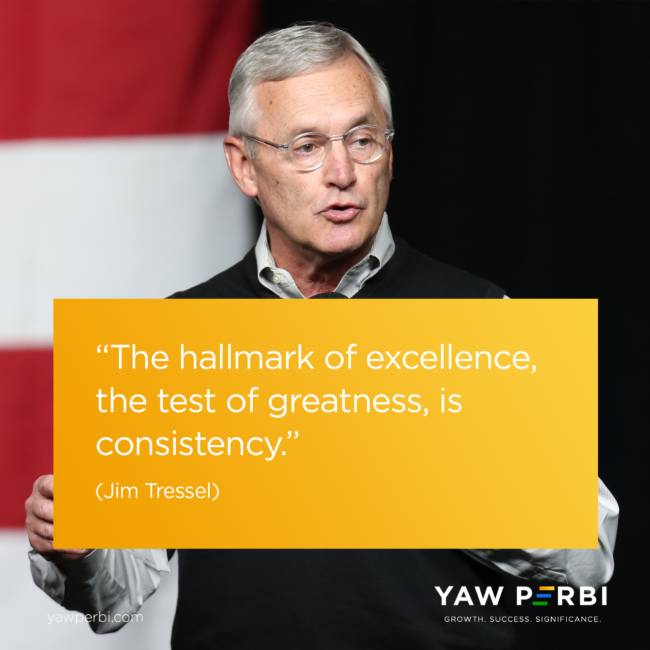
Successful People are Boring
In my late teens when I was introduced to the whole area of personal growth and success I started practising a number of things successful people do without necessarily knowing why. One of them was that they always took their receipts upon purchases. That became an adopted habit for about 10 years before I really got to understand why (that will be for a different day and blog).
One other thing that really fascinated me was the notion that successful people are predictable, consistent; or if you like, plain boring. This was not only in the sense of living a principle-centred life and holding unswervingly to their values but that they had fixed routines. You could literally ‘time them’ and ‘assassinate’ them because it was predictable where they would be, when, and what they would be doing literally every day of the week. That’s precisely what I mean by “successful people are boring.” Same. Same. Same. Same.
So I began to adopt strict routine in many areas of my life including consistently waking up at 4am to spend time in scripture and prayer, thinking, reading and writing. And I have done that consistently for over 25 years now. By the time the rest of the world wakes up and gets going, I would’ve had a 2-3 hour headstart and been über productive.
But now I understand why that consistency breeds success. This is in line with a number of fundamental, universal truths, three of which I would like to share here.
1. RIDING THE LAW OF CONSISTENCY
The Law of Consistency, which leads to growth and success states, “Motivation gets you going; discipline keeps you growing.” Anyone who gets a spark of inspiration or motivation overcomes the law of inertia momentarily but really how long does it last? I heard someone complaining about how transient the umph one gets from motivational talks is. A seasoned motivational speaker responded, rather tongue-in-cheek, “Of course! So are breakfast, lunch and supper!” Like meals, morsels of motivation also need to be taken in reasonable doses several times a day (and in a week) to jumpstart us but what really keeps the wheel of success turning always is discipline. Discipline is doing what we need to do even when we don’t feel like it. And that is the difference between those who succeed and those who don’t. E.M. Gray was spot on: “The successful person has the habit of doing the things that failures don’t like to do. The successful person doesn’t like to do them either, but his dislike is subordinated to the strength of his purpose.”
Disciple is hard; but what makes it more bearable is having a strong WHY, a strong end in mind. The other thing that makes it more doable is discovering your personality (eg. through the DISC behavioural assessment) and linking how you’re wired (what motivates you naturally) with the act you need/want to be consistent with. So for me, being a high D and loving to be in control, I’m greatly motivated to take charge of my morning knowing fully well that no one would be up to disturb me and I can get stuff I want to do done. You’ve got to a find a way, man, for success lies in our daily routine.
“We are what we repeatedly do. Excellence, then, is not an act, but a habit” is famously attributed to Aristotle. What he actually (originally) said was, “As it is not one swallow or a fine day that makes a spring, so it is not one day or a short time that makes a man blessed and happy.” The essence of both statements is the same. John Maxwell pulls no punches here: “You will never change your life until you change something you do daily.” What are you like E-V-E-R-Y-D-A-Y; what do you do E-V-E-R-Y-D-A-Y?
2. RIDING THE LAW OF MOMENTUM
People who are consistent with routine don’t waste precious time and energy figuring out every single day what to do with themselves. If you don’t have a menu, for example (my household does), you know by now how much time and energy can be consumed just by the question: what am I going to eat this afternoon? I have spent an hour on that useless exercise before!
Just like Newton’s first law of motion states, every object will remain at rest or in uniform motion in a straight line unless compelled to change its state by the action of an external force. What is true in Physics–and we tend to appreciate physical laws much more than the unseen laws of life–is the very thing that makes habits so powerful! “Once you pop, you can’t stop” says the Pringles advert. Success can become a habit; so can failure. In fact, Vince Lombardi once said, “once you learn to quit it becomes a habit.” Let the Law of Momentum
When John Maxwell launched 15 Invaluable Laws of Growth in Atlanta, I was there in person. A privileged few joined him for an intimate lunch session. I couldn’t believe the degree of his consistency when talked about his “daily five.” He said, “Everyday I read, I write, I think, I ask questions, I file.”
“Everyday, John?” we asked?
“EVERYDAY,” he responded.
On your birthday, John?
“EVERYDAY,” was his reply.
“On Christmas Day to0, sir?”
“EVERYDAY.”
3. HOW GENIUSES ARE MADE
It was my fellow Canadian, Malcom Gladwell, who first brought to my attention in his book Outliers, that 10,000 hours of practice of any skill makes one a genius. Most people, he said, would’ve done 10,000 of practice within 10 years. During an ongoing Growth Mastermind I was almost envious of the surgeon among us who says everyday he operates; e-v-e-r-y-d-a-y. Imagine his success in 10 years’ time when because of this consistency he has such gained ingenuity! What worthy thing are you doing everyday? Until you’ve done it consistently for 10 years, don’t give up on success just yet.
CONCLUSION
Something you are doing EVERYDAY is determining your future. Conversely, something you are not doing EVERYDAY is determining your future also. More often than not, motivation is overrated. Motivation gets you going but discipline keeps you going, keeps you growing. What will you say is your single most consistent practice (everyday) that has brought you where you are in life today? Please share.

Too Many ‘Big’ Men and Women on the Outside yet so Little on the Inside!

Few birds can boast of the exterior of the peacock and yet… Photo Credit: Alexander Spatari/Getty Images
Carmen Bernos de Gasztold has a collection of poems called The Creature’s Choir which I just ordered (something I should’ve 3-4 years ago!). In it, she puts prayers in the mouths of animals and birds. Bob Fryling, in his book The Leadership Ellipse: Shaping How We Lead by Who We Are, first brought my attention to the peacock’s cry.
This beautiful bird proudly describes its external beauty, while humbly mourning its discordant cry and mournful heart:
“Lord, let a day come,
a heavenly day,
when my inner and outer selves
will be reconciled in perfect harmony.”
Amen and amen!
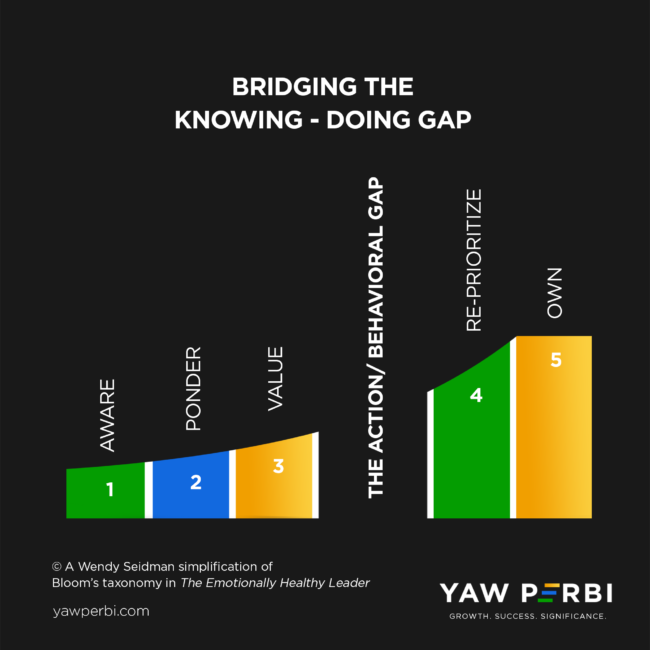
A Sure Way to Close the Widest Gap in the World
By now you should know for yourself that the widest gap in life or in the world is between knowing and doing. If we all put into practice every right thing we knew, our lives would be remarkably different, incredibly successful. Here’s why we don’t and what to do about it, especially in this season of ‘new year resolutions.’
What do a Microbiology PhD, Obstetrician, Civil & Environmental Engineer, Hotel HR Manager in Ghana, Marketing Executive at Ogilvy, Dentist in the United States, Consultant at Accenture, CEO of a Savings & Loans scheme in Uganda and a U.S. military personnel stationed in Italy have in common? And on top of all that, situated in three different continents on the surface not much; except these were all in the same room at the start of 2021 with one desire and purpose: to grow.
There’s no gainsaying that the dozen people constituting the first 15 Invaluable Laws of Growth mastermind group with YAW PERBI in 2021 know a lot. The combined expertise in the room is astounding; it is an honour just to be seated at the table with a leader with 18 years experience at Ghana’s Food & Drugs Authority and the rest of the crew.
We had all chosen to invest the time and money to be part of this mastermind because as Maxwell’s first Law of Growth makes plain, what he calls The Law of Intentionality, “Growth Doesn’t Just Happen.” In fact, “growth is [about] the only guarantee that tomorrow is going to get better”; that 2021 will be better than 2020. Although all these amazing professionals had a hint of this fundamental law of the universe, hence signing onto the mastermind group in the first place, by the end of the first 90-minute session this was so abundantly clear and weighing on us that my personal ‘statement of the day’ came from the FDA leader: “Growth is hard work.” Yes it is! And I’m so proud of these folks who are making an intentional, informed, sustained choice to grow themselves into success and significance!
SECRET TO CLOSING THE GAP
Perhaps no generation knows more, or at least has access to more knowledge in all sorts of media, than this current one. Yet by now you should know for yourself that the widest gap in life or in the world is between knowing and doing. If we all put into practice every right thing we knew, our lives would be remarkably different, incredibly successful. Richard Biggs says “the greatest gap in life is the one between knowing and doing,” a statement similar to John Maxwell’s, who puts it this way: “the greatest gap in the world is the gap between knowing and doing.”
While these already very knowledgeable folks will be even adding further to their professional knowledge vital new information about the Laws of Growth, what will catalyze and even guarantee their change and growth isn’t the HEAD stuff per se. Of course that’s where it begins but the problem is when it ends there, which is more often than note the case.
Considering the above Wendy Seidman simplification of Bloom’s famous taxonomy, the secret to the mastermind participants moving from abundant knowledge to abundant living by doing what they know they ought to do to grow will be as follows (this is the same for you if you intend to finally do something with all you already know you ought to do):
1. AWARE: This is a HEAD thing. Many of us begin from not even knowing what we don’t know, right? “Oh! So there are Laws?” ”Ei! And there are Growth Laws in particular?” right? How can people plan to do what they don’t even know in the first place?
2. PONDER: All of us are going to have ample time in between meetings to THINK about these laws but especially when we meet, as the facilitator I’ll be applying the major tool of a coach–questions, questions questions–to help clarify and deepen the pondering process. I say understanding is the product of pondering. Many times we don’t do because we don’t understand. But thus far, this is all still a HEAD thing.
3. VALUE: When folks actually begin to value that thing they’ve become aware of and have pondered, this is when things have travelled from the head down to the heart. It’s now a HEART thing. “Hmmmm… it must be important.” “Hmmm it may be a good thing oo…” A value is what you value, right?
I tell you, if “the greatest gap in the world is the gap between knowing and doing,” then the longest distance in the world might be between the head and the heart! Anatomically it’s only a few centimetres apart but metaphorically, that’s another matter. Yet it is necessary to value a thing, and feel it to move us to do anything. Do you see the word ‘motion’ in emotion?
Yet after our new awareness and pondering have dropped into the heart , there’s still a GAP—nothing changes in our action or behaviour, yet. It’s still not a HAND thing (action or behaviour) until usually with the help of accountable relationships (like coaches and mastermind compatriots) you gain the quantum energy to scale the action/behavioural gap to the land of re-prioritization. This is the longest and deepest gulf in the world, contributing the most to the gap between knowing and doing.
4. RE-PRIORITIZE: When you re-prioritize, you actually re-organize yourself, move others and things around you to make that new pondered and valued awareness actionable! Until you have re-prioritized, usually evident in the commitment of time, money (and other resources) and energy/effort, nothing changes.
5. OWN: I can give you an example of an area in which this entire process from awareness to ownership happened in my own life. It took me about six years to finally re-prioritize and start taking a proper weekly sabbath (not just a day off; to really stop all my work, rest, contemplate on God, delight in Him and his gifts). I can assure you that if I had a consistent, formal coach or mastermind group I was accountable to, it wouldn’t have taken me six years to make the quantum leap I needed to.
CONCLUSION
After seeing all these long distances and deep gulfs, can you understand why doing what we know is so hard. Come to think of it, who climbs the highest peaks in the world alone? You need a buddy if you’re to make it! That’s why this 15 Laws of Growth mastermind is a blessing! As co-travellers, we’ll all be AWARE of the same laws, PONDER these things (especially through the clarifying questions we’ll all be responding to), we will be expressing what we VALUE to each other’s hearing … and here’s the trick: we are there to encourage each other and hold each other accountable to make the leap to the other side of RE-PRIORITIZING and OWNING our growth and success.
Already, within the first 24 hours of the start of the mastermind, with everyone’s consent we formed a WhatsApp group through which we keep informing and reminding, pondering, valuing, and holding one another accountable to re-prioritize and own our growth journey to success over the next 60 days.
A sure way to close the widest gap in the world is accountable relationships to make the leap from merely valuing new knowing to re-prioritizing things in our lives towards new doing. So now you are aware why we generally don’t do what we know we should or even say we would–and what to do about it–especially in this season of ‘new year resolutions.’ Happy new year!

